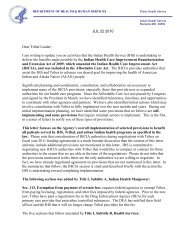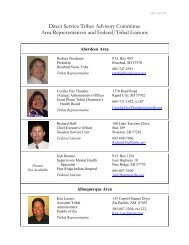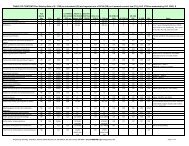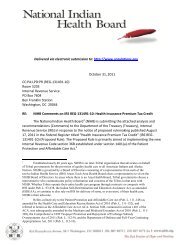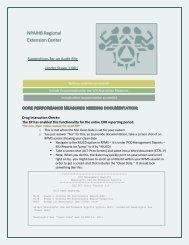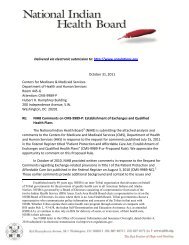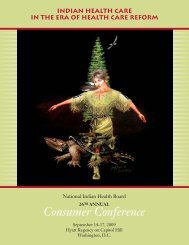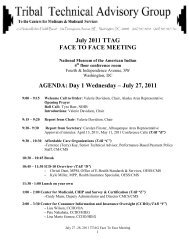mmpc - National Indian Health Board
mmpc - National Indian Health Board
mmpc - National Indian Health Board
Create successful ePaper yourself
Turn your PDF publications into a flip-book with our unique Google optimized e-Paper software.
IGA is identified as the responsible HHS entity, located in the Immediate Office of the Secretary<br />
(IOS) for monitoring compliance with EO 13175 and the Department Tribal Consultation Policy.<br />
In addition, the Secretary has charged the Intradepartmental Council on Native American Affairs<br />
(ICNAA) to meet regularly and no less then 2 times a year and to provide advice on all HHS<br />
policies that relate to <strong>Indian</strong> Tribes as well as instances where HHS activities relate to Native<br />
Americans. Regional consultation sessions have been developed as a systematic method to<br />
regularly consult with <strong>Indian</strong> Tribes on HHS programs at field locations. The goal of these efforts<br />
is to focus HHS on Tribal issues, to continue to enhance the government-to-government<br />
relationship between <strong>Indian</strong> Tribes and the U.S., as well as to make resources of HHS more<br />
readily available to <strong>Indian</strong> Tribes.<br />
6. OBJECTIVES<br />
0. To formalize the Administration’s policy that HHS seek consultation and the participation of<br />
<strong>Indian</strong> Tribes in the development of policies and program activities that impact <strong>Indian</strong><br />
Tribes.<br />
1. To establish a minimum set of requirements and expectations with respect to consultation<br />
and participation throughout HHS management, the Office of the Secretary (OS) Division,<br />
and Regional levels.<br />
2. The need to consult may be identified by the Department or by an <strong>Indian</strong> Tribe(s). Any<br />
time the Tribe(s) or the Department identifies a critical event the Department may initiate<br />
any necessary consultation in accordance with this policy.<br />
3. To identify events and partnerships that HHS would participate with <strong>Indian</strong> Tribe(s) and<br />
Tribal/<strong>Indian</strong> Organizations that establish and foster partnerships with HHS which<br />
complement and enhance consultation with <strong>Indian</strong> Tribes.<br />
4. To promote and develop innovative consultation methods with <strong>Indian</strong> Tribes in the<br />
development of HHS policy and regulatory processes.<br />
5. To uphold the responsibility of HHS to consult with <strong>Indian</strong> Tribes on new and existing<br />
health and human service policies, programs, functions, services and activities that have<br />
Tribal implications.<br />
6. To charge and hold accountable each of the HHS Operating Division Heads for the<br />
implementation of this policy.<br />
7. To be responsive to requests by an <strong>Indian</strong> Tribe(s) request for consultation and technical<br />
assistance in obtaining HHS resources.<br />
8. To charge the HHS Operating Divisions with the responsibility for enhancing partnerships<br />
with <strong>Indian</strong> Tribes which will include, requests for technical assistance, access to programs<br />
and resources, as well as collaborating with Tribal subject matter expertise.<br />
9. To provide a single point of contact within HHS and its Operating Divisions for <strong>Indian</strong> Tribes<br />
at the highest level which would have access to the IOS, the Deputy Secretary, and<br />
Operating Division Heads. The Principal Advisor for Tribal Affairs and the Division Tribal<br />
points of contact will be responsible for compliance with this policy and ensuring<br />
timeframes identified in section 9 are met.<br />
7. CONSULTATION PARTICIPANTS AND ROLES<br />
0. <strong>Indian</strong> Tribes: The government-to-government relationship between the U.S. and<br />
Federally recognized <strong>Indian</strong> Tribes dictates that the principal focus for HHS consultation is<br />
<strong>Indian</strong> Tribes, individually or collectively.<br />
1. <strong>Indian</strong> Organizations: At times it is useful that the HHS communicate with <strong>Indian</strong><br />
organizations to solicit <strong>Indian</strong> Tribe(s) advice and recommendations. The government does<br />
not participate in government-to-government consultations with these entities; rather<br />
these organizations represent the interest of <strong>Indian</strong> Tribes when authorized by those Tribes<br />
These organizations by the sheer nature of their business serve and advocate <strong>Indian</strong> Tribes<br />
issues and concerns that might be negatively affected if these organizations were excluded<br />
from the process.



